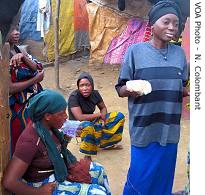-
(单词翻译:双击或拖选)
Port Harcourt, Nigeria
27 May 2007
A group of Nigerian artists and dancers from the Muslim north once dreamt of oil riches in the southern delta1 region, but instead found difficult life in a slum, underneath2 a bridge in Port Harcourt. But as VOA's Nico Colombant reports, they persevere3 in trying to promote their culture.

Happiness despite hardships in Port Harcourt, Nigeria, 27 May 2007
Members of this troupe4 from Kaduna state play drums under threatening rain, amid trash mixed in mud, in front of their tin roof shacks5.
They thought they would be playing for Nigerian dignitaries and rich oil businessmen but instead they are playing for a crowd of slum dwellers6.
The musicians laugh it off, even though they say their houses were razed7 three weeks ago. The foundations of their previous homes pile along the bank of a nearby creek8, but they refuse to leave, and say they will continue enjoying their life, whatever the hardships.
There is more laughter as two of the musicians go bathe in the oily creek below, that also serves as a communal9 toilet and public dump.
One of the leaders, Aminu Yussuf Aruma, says however bad it may look, it is a good place to do some business.
"I am doing business, anything one can, I do. Do you understand? I sell cigarettes, mineral, fuel, water, other things. The business is good, because we are getting small, small things," said Aruma.
Despite the treatment from government officials who told them they were not allowed to be living on the street, Aruma says he cannot complain about common people in Port Harcourt.
"All this place, we do not have bad people. We came here, this is not our place, but we know here it is Nigeria and that Nigeria is one, and that wherever you have been, anywhere you are if you are inside in Nigeria, even though you are in the east, and you are from the north and you come to the east, you come to your land," continued Aruma. "All the people living in Port Harcourt, they like us, what we did here."
He says it is important to continue art despite poverty.
The troupe's main problem, he says, is like for many artists around the world, getting a good agent, which he calls a standing10 man.
"Often now, we do not have anything from this cultural troupe, because we do not have a standing man who will stand for us, so if that person will stand for us. We do not have standing man to hire us and carry on for us to perform," added Aruma.
Sometimes he says they get orders, but then since they do not receive the money upfront, they do not have enough money to pay for the transportation to perform.
Another dancer says artists are like any other Nigerians who do not have connections. He says he has no future, so he spends most of his time getting high.
"I find things very difficult for me. In fact Nigeria as a whole is in trouble because we do not have jobs for people in the country," he said. "We the masses, people, young men in the country, are suffering. As you can see there is no job for me now. We only eat from God, from hand to mouth, because we do not have a job."
He then takes pieces of wood from the trash-littered ground, sharpens them with his teeth and starts playing a new tune11 on the drums, while people from the bridge above stop their endless chase of a few desperate nairas, the local currency, watch, listen and smile amid the smog coming from car fumes12 and a nearby slaughterhouse.
 收听单词发音
收听单词发音
1
delta

|
|
| n.(流的)角洲 | |
参考例句: |
|
|
|
2
underneath

|
|
| adj.在...下面,在...底下;adv.在下面 | |
参考例句: |
|
|
|
3
persevere

|
|
| v.坚持,坚忍,不屈不挠 | |
参考例句: |
|
|
|
4
troupe

|
|
| n.剧团,戏班;杂技团;马戏团 | |
参考例句: |
|
|
|
5
shacks

|
|
| n.窝棚,简陋的小屋( shack的名词复数 ) | |
参考例句: |
|
|
|
6
dwellers

|
|
| n.居民,居住者( dweller的名词复数 ) | |
参考例句: |
|
|
|
7
razed

|
|
| v.彻底摧毁,将…夷为平地( raze的过去式和过去分词 ) | |
参考例句: |
|
|
|
8
creek

|
|
| n.小溪,小河,小湾 | |
参考例句: |
|
|
|
9
communal

|
|
| adj.公有的,公共的,公社的,公社制的 | |
参考例句: |
|
|
|
10
standing

|
|
| n.持续,地位;adj.永久的,不动的,直立的,不流动的 | |
参考例句: |
|
|
|
11
tune

|
|
| n.调子;和谐,协调;v.调音,调节,调整 | |
参考例句: |
|
|
|
12
fumes

|
|
| n.(强烈而刺激的)气味,气体 | |
参考例句: |
|
|
|















